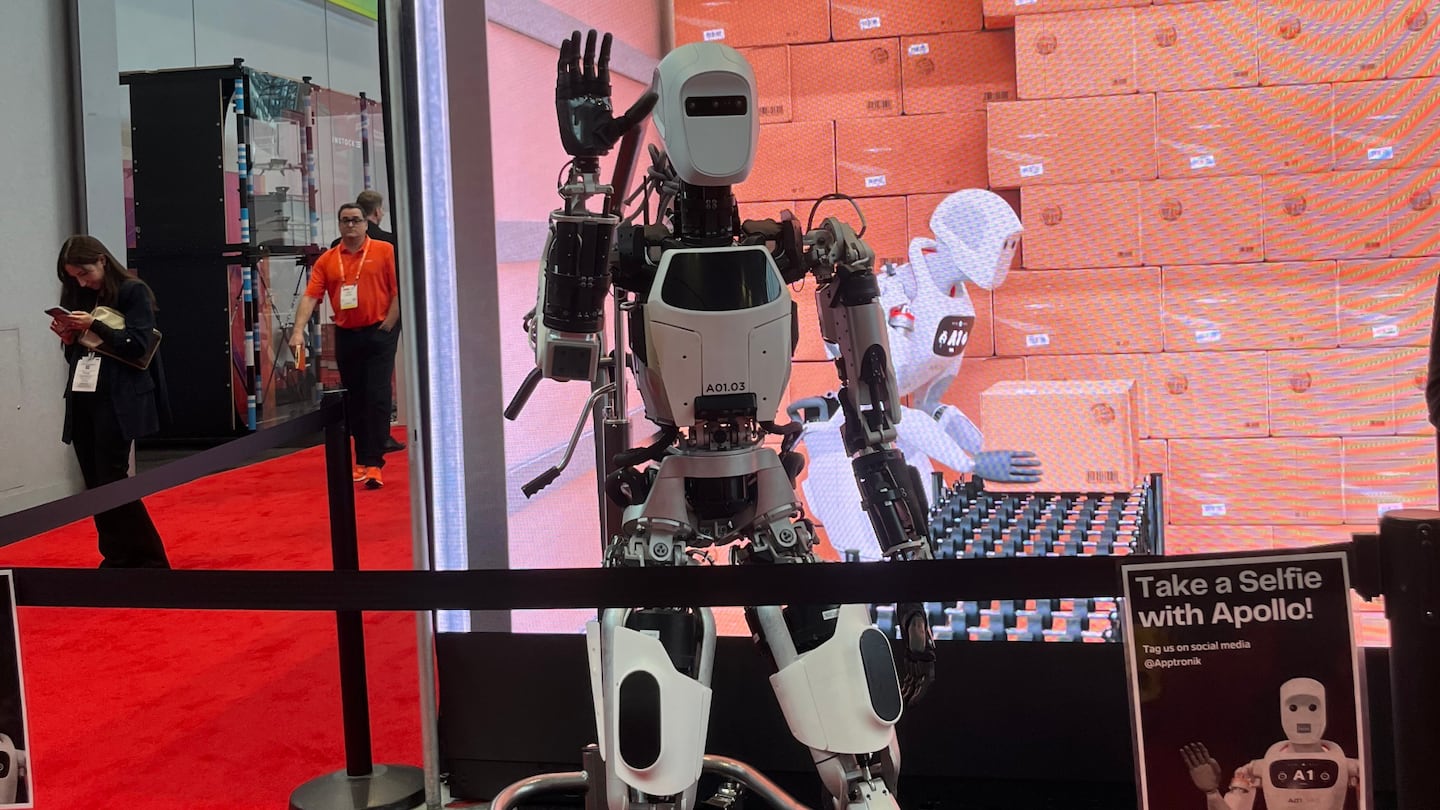
The Business of Fashion
Agenda-setting intelligence, analysis and advice for the global fashion community.

Agenda-setting intelligence, analysis and advice for the global fashion community.

The next era of retail will be filled with artificial intelligence, robots and even some holograms, at least if NRF was any indication.
The National Retail Federation’s gargantuan annual conference again took over New York’s Javits Center this week, drawing vendors and guests from around the world. As in years past, it included an Innovation Lab dedicated to new technologies NRF says show what retail can be now and in the future.
The ideas spanned everything from the latest in warehouse robotics to augmented-reality mirrors that let shoppers virtually try on products, in case they don’t want to make the trip to the fitting room or an item isn’t in stock. Two different companies had hologram displays. But the tech that dominated all others was undoubtedly AI.
Of the 50 or so companies that were present, around 20 included some form of AI in their pitches to retailers and attendees. There was AI for analysing which foot traffic in stores actually yields conversions, for personalising product recommendations according to a shopper’s psychographic profile, for predicting consumer demand and more.
ADVERTISEMENT
Generative AI, the newest widely hyped technology, took its share of the spotlight. Companies were selling services that could give shoppers styling tips, create text and image content for marketing campaigns and e-commerce sites, produce blog posts to boost a brand in Google search, generate backgrounds for product photos and power chatbots to help online shoppers, among other applications.
None of the ideas on their own seemed ready to revolutionise retail. But together they painted a picture of an industry that’s growing more efficient, data-driven and optimised for even the smallest tasks.
A perennial objective for retailers is to get better at targeting the right shopper with the right product at the right time in order to turn them into paying customers. It’s one area where AI can potentially help since it’s able to process large amounts of data to make predictions.
Onebeat, for instance, which was among the companies in the Innovation Lab, uses AI to help retailers better manage and allocate inventory so they have the correct products in their stores based on what customers are likely to buy. Another company, Psykhe, uses AI to help retailers recommend products based on the shopper’s psychological profile. Founder and chief executive Anabel Maldonado, who also spoke at BoF’s 2023 technology summit, gave the example of a big-box retailer such as CostCo knowing that the female customer buying La Mer body cream is the same shopper who also tends to buy Calm magnesium powder.
A number of the generative-AI tools on offer, meanwhile, aimed at making normally time-consuming tasks faster and easier. Typeface.ai, which specialises in what it called personalised content for retailers, lets users quickly generate text or imagery on demand for different purposes, including email marketing campaigns, SEO-optimised blog posts, e-commerce landing pages or Google display ads. (Google Ventures is one of its investors.) Booth.ai, on the other hand, is more narrowly focused on photography. It can take a product photo and render it on a model with the background of your choosing.
“Where AI plays a role is that it makes entrepreneurship way more accessible,” said Harley Finkelstein, president of Shopify, which had a booth at NRF this year.
Shopify has its own suite of AI features, Shopify Magic, including one that enables users to generate product descriptions. Finkelstein said the result might not be quite as good just yet as the copy drafted by Alo Yoga — a Shopify customer he said puts a great deal of thought and care into its product descriptions — but for the person setting up an online storefront from their kitchen table, without Alo’s resources, it’s more than enough to get them started. And for big companies, he added, it can allow staff to spend less time on copywriting and more on creative thinking or other tasks.
It’s too early to predict just how much of an impact these innovations will have. In a new report on AI this month, the Luxury Institute noted that the promises of technology companies don’t always match the results seen by business, pointing to CRM in the 1980s, e-commerce in the 1990s and programmatic advertising in the 2010s. “Tech vendors are not fiduciaries; they serve their own interests,” it said.
ADVERTISEMENT
Then again, few in fashion today would write off e-commerce, even if it took some time to get moving.
Retail leaders are certainly paying attention to generative AI. A recent EY survey of more than 250 executives in retail and CPG found that 99.6 percent — basically all of them — said they were experimenting with the technology in some form.
AI isn’t the only new tech that could exert an influence on retail in the years ahead. The Innovation Lab also included a couple blockchain-centric companies, such as Arianee, which is busy creating digital product passports for brands such as Mugler. Others provided software to help companies organise their marketing, whether retail media placements or sales via influencers in the case of Replika, which was also part of LVMH’s start-up accelerator.
Still, the message at NRF was clear: As 2024 gets underway, all eyes in retail are on AI.
From ChatGPT to Midjourney to Runway, the emerging technology is already showing why it could be one of the most consequential in decades for the fashion industry. Early adopters and experts unpack the opportunities and challenges of putting gen AI to use to design products, create campaigns and other content, and better connect with customers.
A growing number of fashion and beauty brands are looking to AI to solve age-old recruiting challenges, from wading through piles of résumés to writing job postings — but even with all their promise, these new technologies aren’t without shortcomings.
One of the technology’s great promises is to let retailers make far more accurate forecasts about how much to produce, down to the level of size and colour. But knowing what consumers will want months in advance isn’t so simple.

Marc Bain is Technology Correspondent at The Business of Fashion. He is based in New York and drives BoF’s coverage of technology and innovation, from start-ups to Big Tech.
The algorithms TikTok relies on for its operations are deemed core to ByteDance overall operations, which would make a sale of the app with algorithms highly unlikely.
The app, owned by TikTok parent company ByteDance, has been promising to help emerging US labels get started selling in China at the same time that TikTok stares down a ban by the US for its ties to China.
Zero10 offers digital solutions through AR mirrors, leveraged in-store and in window displays, to brands like Tommy Hilfiger and Coach. Co-founder and CEO George Yashin discusses the latest advancements in AR and how fashion companies can leverage the technology to boost consumer experiences via retail touchpoints and brand experiences.
Four years ago, when the Trump administration threatened to ban TikTok in the US, its Chinese parent company ByteDance Ltd. worked out a preliminary deal to sell the short video app’s business. Not this time.